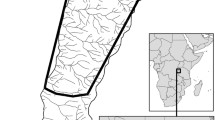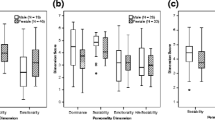Abstract
A 46-item rating scale was used to obtain personality ratings from 75 captive chimpanzees (Pan troglodytes) from 7 zoological parks. Factor analysis revealed five personality dimensions similar to those found in previous research on primate personality: Agreeableness, Dominance, Neuroticism, Extraversion and Intellect. There were significant sex and age differences in ratings on these dimensions, with males rated more highly on Dominance and older chimpanzees rated as more agreeable but less extraverted than younger chimpanzees. Interobserver agreement for most individual trait items was high, but tended to be less reliable for trait terms expressing more subtle social or cognitive abilities. Personality ratings for one zoo were found to be largely stable across a 3-year period, but highlighted the effects of environmental factors on the expression of personality in captive chimpanzees.
Similar content being viewed by others
References
Bolig R, Price CS, O’Neill P, Suomi SJ (1992) Subjective assessment of reactivity level and personality traits of rhesus monkeys. Int J Primatol 3:287–306
Costa PT, McCrae RR (1992) Revised NEO Personality Inventory (NEO-PI-R) and NEO Five-Factor Inventory (NEO-FFI) professional manual. Psychological Assessment Resources, Odessa, FL
Digman JM (1990) Personality structure: emergence of the five-factor model. Annu Rev Psychol 41:417–440
Dingemanse NJ, Réale D (2005) Natural selection and animal personality. Behaviour 142:1165–1190
Draper TW (1995) Canine analogs of human personality factors. J Gen Psychol 122:241–252
Dutton D, Clark RA, Dickins DW (1997) Personality in captive chimpanzees: use of a novel rating procedure. Int J Primatol 18:539–552
Emery NJ, Clayton NS, Frith CD (eds) (2007) Social intelligence: from brain to culture. Philos Trans R Soc B 362(1480):485–754
Gosling SD (2001) From mice to men: what can we learn about personality from animal research? Psychol Bull 127:45–86
Gosling SD, John OP (1999) Personality dimensions in non-human animals: a cross-species review. Curr Dir Psychol Sci 8:69–75
Gosling SD, Vazire S (2002) Are we barking up the right tree? Evaluating a comparative approach to personality. J Res Pers 36:607–614
Hays WL (1981) Statistics, 3rd edn. Holt, Rinehart and Winston, New York
Howell D (1982) Statistical methods for psychology, 2nd edn. Duxbury, Boston
Hinde RA (1979) The nature of social structure. In: Hamburg DA, McCown ER (eds) Perspectives of human evolution. Cummings, London, pp 1–21
Hinde RA (1995) A suggested structure for a science of relationships. Personal Relationships 2:1–15
Hinde RA, Spencer-Booth Y (1971) Towards understanding individual differences in rhesus-mother infant interaction. Anim Behav 19:165–173
Horn JL (1965) A rationale and test for the number of factors in factor analysis. Psychometrika 30:179–185
Itoh K (2002) Personality research with non-human primates: theoretical formulation and methods. Primates 43:249–261
Jones AC, Gosling SD (2005) Temperament and personality in dogs (Canis familiaris): a review and evaluation of past research. Appl Anim Behav Sci 95:1–53
Kelly GA (1955) The psychology of personal constructs. Norton, New York
King JE, Figueredo AJ (1997) The five factor model plus dominance in chimpanzee personality. J Res Person 31:257–271
King JE, Weiss A, Farmer KH (2005) A chimpanzee (Pan troglodytes) analogue of cross-national generalization of personality structure: zoological parks and an African sanctuary. J Person 73:389–410
Ley J, Bennett P, Coleman G (2008) Personality dimensions that emerge in companion canines. Appl Anim Behav Sci 110:305–317
Martau PA, Caine NG, Candland DG (1985) Reliability of the emotions profile index, primate form, with Papio hamadryas, Macaca fuscata, and two Saimiri species. Primates 26:501–505
Martin JE (2005) The influence of rearing on personality ratings of captive chimpanzees (Pan troglodytes). Appl Anim Behav Sci 90:67–181
McCrae RR, Costa PT (1997) Concepts and correlates of Openness to Experience. In: Briggs SR, Hogan R, Jones WH (eds) Handbook of personality psychology. Academic Press, San Diego, pp 827–847
McCrae RR, Terracciano A, 78 Members of the Personality Profiles of Cultures Project (2005) Universal features of personality traits from the observer’s perspective: data from 50 cultures. J Person Soc Psychol 88:547–561
McGuire MT, Raleigh MJ, Pollack DB (1994) Personality features in vervet monkeys: the effects of sex, age, social status, and group composition. Am J Primatol 33:1–13
O’Connor BP (2000) SPSS, SAS, and MATLAB programs for determining the number of components using parallel analysis and Velicer’s MAP test. Behav Res Methods 32:396–402
Pederson AK, King JE, Landau VI (2005) Chimpanzee (Pan troglodytes) personality predicts behavior. J Res Person 39:534–549
Penke L, Denissen JJA, Miller GF (2007) The evolutionary genetics of personality. Eur J Person 21:549–587
Pervin LA, John OP (eds) (1999) Handbook of personality. Guilford, New York
Réale D, Reader SM, Sol D, McDougall PT, Dingemanse NJ (2007) Integrating animal temperament within ecology and evolution. Biol Rev 82:291–318
Roberts BW, Walton KE, Viechtbauer W (2006) Patterns of mean-level change in personality traits across the life course: a meta-analysis of longitudinal studies. Psychol Bull 132:1–25
Sapolsky RM (2005) The influence of social hierarchy on primate health. Science 308:648–652
Stevenson-Hinde J, Zunz M (1978) Subjective assessment of individual rhesus monkeys. Primates 19:473–482
Suomi SJ (1991) Uptight and laidback monkeys: individual differences in response to social challenges. In: Brauth SE, Hall WS, Dooling RJ (eds) Plasticity of development. MIT Press, Cambridge, pp 27–56
Uher J, Asendorpf JB, Call J (2008) Personality in the behaviour of great apes: temporal stability, cross-situational consistency and coherence in response. Anim Behav 75:99–112
Weiss A, King JE, Figueredo AJ (2000) The heritability of personality factors in chimpanzees (Pan troglodytes). Behav Genet 30:213–221
Weiss A, King JE, Perkins L (2006) Personality and subjective well-being in orangutans (Pongo pygmaeus and Pongo abelii). J Person Soc Psychol 90:501–511
Weiss A, King JE, Hopkins WD (2007) A cross-setting study of chimpanzee (Pan troglodytes) personality structure and development: zoological parks and Yerkes national primate research centre. Am J Primatol 69:1264–1277
Whiten A, van Schaik CP (2007) The evolution of animal ‘cultures’ and social intelligence. Philos Trans R Soc Lond B Biol Sci 362:603–620
Acknowledgments
I would like to thank staff and raters at Aalborg Zoo (Denmark); Krefelder Zoo (Germany); Tygerberg Zoopark (South Africa); Twycross Zoo (England); Sedgewick County Zoo (United States); Belfast Zoo (Northern Ireland) and Chester Zoo (England), for contributing ratings, and two anonymous reviewers for their very helpful comments on the manuscript.
Author information
Authors and Affiliations
Corresponding author
About this article
Cite this article
Dutton, D.M. Subjective assessment of chimpanzee (Pan troglodytes) personality: reliability and stability of trait ratings. Primates 49, 253–259 (2008). https://doi.org/10.1007/s10329-008-0094-1
Received:
Accepted:
Published:
Issue Date:
DOI: https://doi.org/10.1007/s10329-008-0094-1




